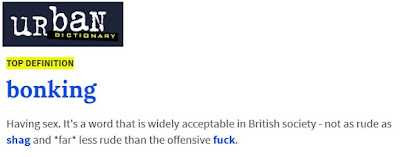(First posted 10th May, 2017)
I used to have a book by a pair of American educationalists called Curtis Jay Bonk and Kira S. King. Students used to call it the bonking book. The surnames of the two authors were juxtaposed on the spine in such a way as to make it look as if it was a book about bonking: “a bonking good read” perhaps.
The cover shows the first author’s name in full, but in the rest of the book and on his web site he goes by the shorter Curt Bonk. Does he know how that sounds to English ears? Perhaps he does. It might be his come on line.
I’m not sure when I first encountered the word “bonk”. It wasn’t at school in Yorkshire. Bonk would then have meant hitting someone on the top of the head, or perhaps the percussive knock made by a large piece of wood. Runners and cyclists also now use it to mean running out of energy. I don’t think it emerged in the sexual sense until the nineteen-seventies. I can imagine Jo Kendall’s elegant but naughty voice saying it in “I’m Sorry I’ll Read That Again”, but perhaps she never actually did. It would have amused me if she had.
The alternatives would have been completely unacceptable on broadcast media before the -seventies, despite the efforts of Brendan Behan and Kenneth Tynan who came out with the f-word on live television in the -fifties and -sixties, or even the music hall comedian Hector Thaxter who is said to have got away with “arse” on the radio in 1936.
Most of us don’t seem to notice swearing now. It was better when it was the exception rather than the rule. It was kinder when the worst we heard was “naff off” and “bonk”.



